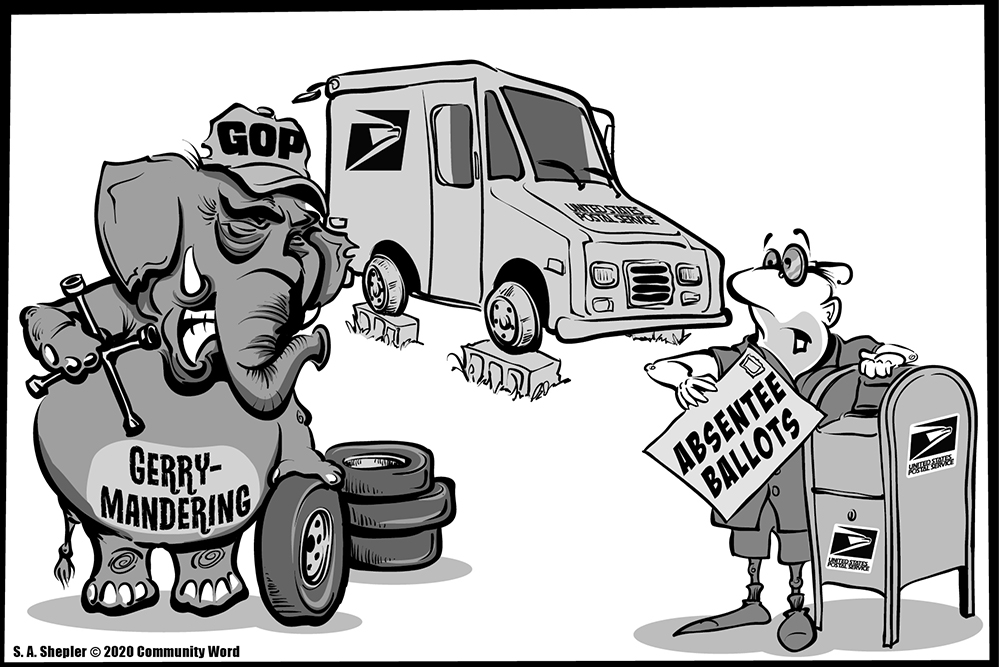 A perfect storm of voter suppression in the middle of a global pandemic failed in Wisconsin last month. The Democratic governor tried to postpone the election to a later, safer date –– a move many states had already done. The Wisconsin GOP legislature blocked that move, figuring that going ahead with the election would be hardest on minorities and democratic-leaning voters. The state supreme court, stacked with conservative right-leaning justices, upheld the decision to proceed with the election despite the health risks. And we knew the once-esteemed U.S. Supreme Court now bends toward autocratic rule.
A perfect storm of voter suppression in the middle of a global pandemic failed in Wisconsin last month. The Democratic governor tried to postpone the election to a later, safer date –– a move many states had already done. The Wisconsin GOP legislature blocked that move, figuring that going ahead with the election would be hardest on minorities and democratic-leaning voters. The state supreme court, stacked with conservative right-leaning justices, upheld the decision to proceed with the election despite the health risks. And we knew the once-esteemed U.S. Supreme Court now bends toward autocratic rule.
So Wisconsin voters turned out in rain and sleet, in the midst of stay-at-home orders due to the global pandemic and in long lines because the pandemic caused many polling locations to close.
They voted, and their vote threw out the conservative Daniel Kelly appointed by nightmare governor Scott Walker. They voted in progressive Jill Karofsky.
Now the country needs to live up to the leadership of Wisconsin voters, many of whom had applied for absentee ballots due to age and ill health –– but those mail-in ballots never arrived. So they went to the polls and stood in line for hours.
Now Congress needs to pass the Natural Disaster and Emergency Ballot Act of 2020 that expands absentee voting. Illinois recognizes the right of everyone to vote by mail; now we need to extend that right to the entire country. Wisconsin is only our latest example of a long and shameful history of voter suppression in this country. In Wisconsin, voters resisted, and they won.
What COVID-19 can tell us about Palestinian human rights
COVID-19 shows us there are no national boundaries, walls or territories capable of keeping out viruses that can sweep around the world creating destructive pandemics. The most vulnerable people in the world can carry disease to the most privileged people in the world. The only protection is to ensure basic human rights and well-being for everyone.
Social welfare programs and foreign aid don’t just help the poor and vulnerable. They ensure the safety of everyone.
A slim booklet, “Why Palestine Matters: The Struggle to End Colonialism” published by the Israel/Palestine Mission Network of the Presbyterian Church (U.S.A.), reviews the history of flawed decisions that have fueled terrorism, nationalism and conflict in the Middle East and views these mistakes through a global intersectional perspective.In the introduction, Richard Falk, former Special Rapporteur for Occupied Palestinian Territories, UN Human Rights Council, writes that the Palestinian right to self-determination must be balanced by the corresponding rights of Jewish people. That balance has stymied diplomatic efforts at conflict resolution and peace in the Middle East.
Falk writes that merely ending the occupation is an outmoded way of moving toward peace. He believes international law mandates that “negotiation of a sustainable peace depends on the prior disavowal and abandonment of the apartheid regime that Israel relies upon to subjugate the Palestinian people.”
Peace and safety can’t be achieved by establishing winners and losers.
“Justice is indivisible. Peace is indivisible. Justice in one place is not enough without justice everywhere; peace in one place is insufficient without peace everywhere,” he writes.
Any system of apartheid and discrimination weakens the social fabric and well being of everyone.
COVID-19 illustrates very clearly that discrimination and social injustice made America more vulnerable and less safe. Latinx and African American people are dying from COVID-19 at rates exceeding whites because of underlying health conditions and lack of healthcare –– both tied to racism. The Affordable Care Act and Medicare for All are initiatives designed to reduce discrimination and inequalities that breed risk. When people can’t afford to see a doctor and can’t afford to miss work because they have no paid sick leave, that puts the entire community at risk. Thinking existentially in terms of universal rights is necessary for the planet to survive.
“Colonialism and empire are phenomena that trace their origins to centuries past but that continue to have a global impact in a new guise today –– through, for instance, neocolonial and neoliberal economic policies, through settler colonialism as practiced by Israel in Palestine, and through U.S. military dominance,” Falk writes. “The cross-fertilization and intersectionality of activism among new movements such as Black Lives Matter and the water protectors at the Standing Rock Sioux Reservation, as well as the older quest for justice through Liberation Theology, have linked the Palestinian quest in a global struggle against the overarching domination of colonial and imperial interests.”
We now have an unprecedented opportunity to understand the intersectionality of resistance movements spanning race, economics, gender, immigration, education, mass incarceration and climate change through a lens of universal justice.

Recent Comments